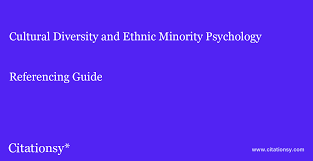The Importance of Cultural Diversity in Ethnic Minority Psychology
Understanding the significance of cultural diversity in ethnic minority psychology is crucial for promoting mental health and well-being among diverse populations. The field of ethnic minority psychology focuses on the study of individuals from various cultural backgrounds, acknowledging the impact of culture, ethnicity, and race on psychological processes and behaviours.
Cultural diversity enriches our society by bringing together individuals with unique perspectives, traditions, and values. In the context of psychology, it highlights the importance of considering cultural factors when addressing mental health issues within ethnic minority communities.
One key aspect of cultural diversity in ethnic minority psychology is the recognition of different belief systems and practices that influence how individuals perceive and experience mental health. By embracing cultural diversity, psychologists can tailor their approaches to therapy and intervention to better meet the needs of clients from diverse backgrounds.
Moreover, promoting cultural diversity in ethnic minority psychology helps combat stigma surrounding mental health within minority communities. By acknowledging and respecting cultural differences, psychologists can create a safe and inclusive space for individuals to seek help without fear of judgment or discrimination.
In conclusion, embracing cultural diversity in ethnic minority psychology is essential for fostering a more inclusive and culturally sensitive approach to mental health care. By recognising the unique experiences and perspectives of individuals from diverse backgrounds, psychologists can better support the well-being of all members of society.
Embracing Cultural Diversity: Five Essential Tips for Enhancing Ethnic Minority Psychology
- Respect and value cultural differences to promote inclusivity.
- Be aware of your own biases and stereotypes when working with individuals from different backgrounds.
- Understand the impact of systemic discrimination on mental health within ethnic minority communities.
- Encourage open dialogue and communication to bridge cultural divides.
- Seek training and education on cultural competence to enhance your understanding and practice in ethnic minority psychology.
Respect and value cultural differences to promote inclusivity.
Respecting and valuing cultural differences is a fundamental tip in promoting inclusivity within ethnic minority psychology. By acknowledging and appreciating the diverse beliefs, traditions, and values of individuals from different cultural backgrounds, psychologists can create an environment that fosters understanding and acceptance. Embracing cultural diversity not only enriches the field of psychology but also ensures that mental health support is tailored to the specific needs of each individual, ultimately leading to more effective and inclusive care for all members of society.
Be aware of your own biases and stereotypes when working with individuals from different backgrounds.
It is crucial to be mindful of your own biases and stereotypes when engaging with individuals from diverse backgrounds in the field of ethnic minority psychology. Recognising and addressing personal prejudices is essential for building trust and rapport with clients, as well as ensuring culturally sensitive and effective therapeutic interventions. By being aware of our own biases, we can approach each individual with an open mind, empathy, and a genuine desire to understand their unique experiences and perspectives. This self-awareness is key to fostering a supportive and inclusive environment that respects the cultural diversity of those we work with.
Understand the impact of systemic discrimination on mental health within ethnic minority communities.
Understanding the impact of systemic discrimination on mental health within ethnic minority communities is paramount in addressing the unique challenges faced by individuals from diverse backgrounds. Systemic discrimination can have profound effects on psychological well-being, leading to increased levels of stress, anxiety, and feelings of marginalisation among ethnic minorities. By acknowledging and addressing these systemic barriers, psychologists can better support individuals in navigating the complexities of their mental health within the context of cultural diversity.
Encourage open dialogue and communication to bridge cultural divides.
Encouraging open dialogue and communication is a powerful tip in promoting cultural diversity and enhancing ethnic minority psychology. By fostering conversations that bridge cultural divides, individuals from different backgrounds can share their perspectives, experiences, and values in a respectful and inclusive manner. This open exchange of ideas not only promotes understanding and empathy but also helps build stronger connections within diverse communities. Effective communication lays the foundation for building trust, breaking down stereotypes, and creating a supportive environment where everyone’s voice is heard and valued.
Seek training and education on cultural competence to enhance your understanding and practice in ethnic minority psychology.
Seeking training and education on cultural competence is a valuable tip for enhancing understanding and practice in ethnic minority psychology. By investing in learning about different cultural backgrounds, beliefs, and practices, psychologists can develop the necessary skills to provide more effective and culturally sensitive care to clients from diverse ethnic minority groups. Cultural competence training enables psychologists to navigate cultural differences, communicate effectively across diverse populations, and tailor their therapeutic approaches to meet the unique needs of each individual. Ultimately, by prioritising ongoing education in cultural competence, psychologists can foster a more inclusive and supportive environment for ethnic minority clients seeking mental health services.

